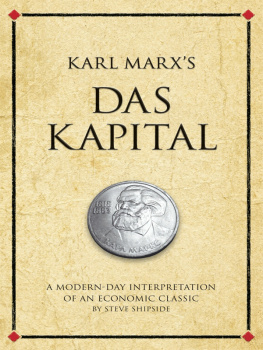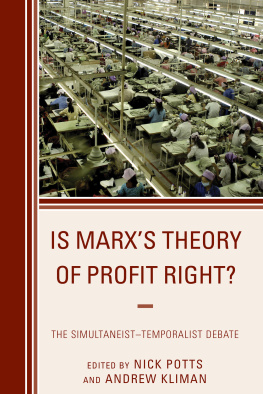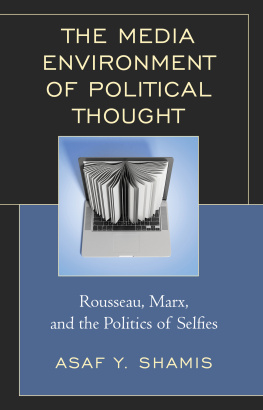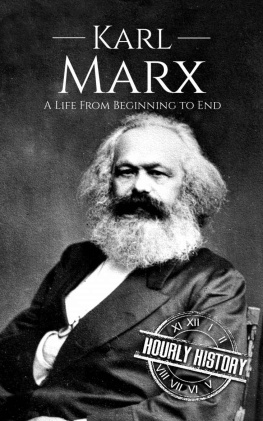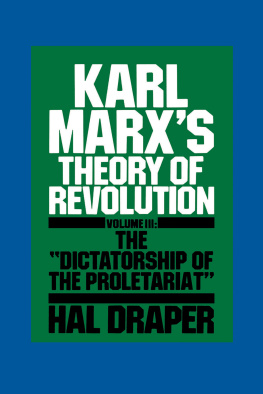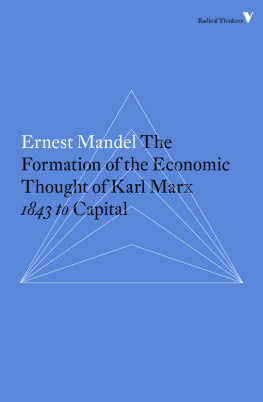Marx Karl - Karl Marxs Das Kapital: a modern-day interpretation of an economic classic
Here you can read online Marx Karl - Karl Marxs Das Kapital: a modern-day interpretation of an economic classic full text of the book (entire story) in english for free. Download pdf and epub, get meaning, cover and reviews about this ebook. City: Oxford, year: 2009, publisher: Infinite Ideas Ltd, genre: Politics. Description of the work, (preface) as well as reviews are available. Best literature library LitArk.com created for fans of good reading and offers a wide selection of genres:
Romance novel
Science fiction
Adventure
Detective
Science
History
Home and family
Prose
Art
Politics
Computer
Non-fiction
Religion
Business
Children
Humor
Choose a favorite category and find really read worthwhile books. Enjoy immersion in the world of imagination, feel the emotions of the characters or learn something new for yourself, make an fascinating discovery.
- Book:Karl Marxs Das Kapital: a modern-day interpretation of an economic classic
- Author:
- Publisher:Infinite Ideas Ltd
- Genre:
- Year:2009
- City:Oxford
- Rating:3 / 5
- Favourites:Add to favourites
- Your mark:
- 60
- 1
- 2
- 3
- 4
- 5
Karl Marxs Das Kapital: a modern-day interpretation of an economic classic: summary, description and annotation
We offer to read an annotation, description, summary or preface (depends on what the author of the book "Karl Marxs Das Kapital: a modern-day interpretation of an economic classic" wrote himself). If you haven't found the necessary information about the book — write in the comments, we will try to find it.
Karl Marxs Das Kapital: a modern-day interpretation of an economic classic — read online for free the complete book (whole text) full work
Below is the text of the book, divided by pages. System saving the place of the last page read, allows you to conveniently read the book "Karl Marxs Das Kapital: a modern-day interpretation of an economic classic" online for free, without having to search again every time where you left off. Put a bookmark, and you can go to the page where you finished reading at any time.
Font size:
Interval:
Bookmark:


OTHER TITLES IN
THE INFINITE SUCCESS SERIES
Adam Smiths The Wealth of Nations
Benjamin Franklins The Way to Wealth
Charles Mackays Extraordinary Popular Delusions and the Madness of Crowds
George S. Clasons The Richest Man in Babylon
Napoleon Hills Think and Grow Rich
Niccolo Machiavellis The Prince
Samuel Smiles Self-help
Sun Tzus The Art of War

Copyright Infinite Ideas Limited, 2009
The right of Steve Shipside to be identified as the author of this book has been asserted in accordance with the Copyright, Designs and Patents Act 1988.
First published in 2009 by
Infinite Ideas Limited
36 St Giles
Oxford, OX1 3LD
United Kingdom
www.infideas.com
All rights reserved. Except for the quotation of small passages for the purposes of criticism or review, no part of this publication may be reproduced, stored in a retrieval system or transmitted in any form or by any means, electronic, mechanical, photocopying, recording, scanning or otherwise, except under the terms of the Copyright, Designs and Patents Act 1988 or under the terms of a licence issued by the Copyright Licensing Agency Ltd, 90 Tottenham Court Road, London W1T 4LP, UK, without the permission in writing of the publisher. Requests to the publisher should be addressed to the Permissions Department, Infinite Ideas Limited, 36 St Giles, Oxford, OX1 3LD, UK, or faxed to +44 (0)1865 514777.
A CIP catalogue record for this book is available from the British Library
ISBN 978-1-906821-04-3
Brand and product names are trademarks or registered trademarks of their respective owners.
Designed and typeset by Cylinder
Printed in India
BRILLIANT IDEAS

On the face of it theres something particularly perverse about writing a modern business ideas book based on an interpretation of Karl Marx. This is, after all, the man who wrote the Communist Manifesto, the man whose only interest in penning Das Kapital was to expose the workings of the capitalist system and its pitiless, unsustainable nature in exploiting the working man.
Marx believed that the capitalist system carried the seed of its own doom and would inevitably implode precisely because it was so grossly unfair. He was convinced that not only was a workers revolution the wholly desirable consequence of capitalism but also an unavoidable one. On this basis the only real interpretation of Kapital would seem to be to burn the building down to go and strike heroic poses in the street with a sledgehammer.
There again, this is the man who said of himself that he was no Marxist. Our understanding of him is inevitably coloured by the interpretation of others and in particular a number of grim, grey regimes and the cant-spouting acolytes they churned out. When you go back to the original, the over-riding impression is of an observer and thinker who is appalled by the hardship suffered by workers, and deeply concerned about perpetuating the system that makes it happen. Its striking just how many of his observations and concerns are every bit as valid now as they were in the 1860s. Marx wasnt just the founding father of communism - he can equally be seen as one of the forefathers of the much more recent, far more trendy, and thoroughly more attractive school of anti-globalisation. He was in no doubt that the workers of the world are not only chained, but linked to each other by those chains. As such, he anticipated the growing concern that we havent removed the misery of worker exploitation - weve just shipped it over the horizon where we dont actually have to look at it any more. Marxs reflections on sustainable and unsustainable capitalism could just as easily be taken as the starting points for modern business concerns such as ethical consumerism, corporate social responsibility and Fairtrade. The fact that he points out the cyclical nature of capitalism with its boom and bust is particularly interesting reading today, and his documenting of the greed of bankers and the smoke and mirrors of stock markets has special resonance in the light of the credit crunch of 20089.
What the modern business commentator knows that Marx didnt, however, was that capitalism wasnt about to implode at the turn of the twentieth century. Instead, some elements of capitalism have recognised its downside and a different, newer way of managing people, resources and exchange has sprung up. This book looks at the concerns of Karl Marx in the light of todays troubles, and suggests some of the alternatives to revolution that have sprung up to deal with the injustice of the system. It is aimed at the modern businessperson who likes to think a little laterally, who is probably involved in some way with the management of people and has a sense of responsibility for that. But it also recognises, as Marx did, that every worker is also a person and as such should be encouraged to develop individually and creatively - without exploiting the others, whose lives they in turn impact upon.
The monopoly of capital becomes a fetter upon the mode of production, which has sprung up and flourished along with, and under it. Centralisation of the means of production and socialisation of labour at last reach a point where they become incompatible with their capitalist integumentThe knell of capitalist private property sounds.
DEFINING IDEA
Sir Isaac Newton was asked about the continuance of the rising of South Sea stockHe answered that he could not calculate the madness of people.
~ LORD RADNOR
Marxs apocalyptic language reflects his conviction that the seeds of capitalisms downfall are to be found in its core - basically the whole system will accelerate to a pitch where capitalism eats itself. If that sounds melodramatic, bear in mind that the 2009 economic downturn has revealed that the cutting edge of capitalism has become the packaging up and selling on of bad debt. If thats not capitalism eating itself, its hard to imagine what is.
Sub-prime mortgages and junk bonds may be recent twists to the tale but Marx was more than familiar with the absurdities of untrammelled capitalism - in 1719, the South Sea Company proposed a scheme by which it would buy more than half the national debt of Britain. That triggered a share spike in which a rash of unsound companies rushed to market, but by 1720 all these schemes had collapsed - but capitalisms appetite for the unfeasible is clearly undiminished.
Profits are for wimps was the famous motto of Jeff Bezos, CEO of Amazon at the height of the dot-com boom at the end of the nineties. When the dot-com boom turned into the dot-bomb collapse, financial markets ruefully reminded each other that profits are actually for shareholders and a financial model based on no product at all is always a bubble ripe for bursting. The sub-prime scandal followed in less than a decade. At the time of writing, the financial world is still reeling from the $50 billion scam pulled off by Wall Street broker Bernard Madoff. That has rapidly been denounced as a classic pyramid scheme in which the whole edifice stands on the shoulders of new punters who are brought in with their money. The key point of a pyramid scheme is that at its heart there is a void rather than a genuine product. Nothing at all, therefore, like those perfectly legitimate financial transactions in which unrecoverable debt is traded from one bank to another for ever-increasing amounts of money.
Next pageFont size:
Interval:
Bookmark:
Similar books «Karl Marxs Das Kapital: a modern-day interpretation of an economic classic»
Look at similar books to Karl Marxs Das Kapital: a modern-day interpretation of an economic classic. We have selected literature similar in name and meaning in the hope of providing readers with more options to find new, interesting, not yet read works.
Discussion, reviews of the book Karl Marxs Das Kapital: a modern-day interpretation of an economic classic and just readers' own opinions. Leave your comments, write what you think about the work, its meaning or the main characters. Specify what exactly you liked and what you didn't like, and why you think so.

